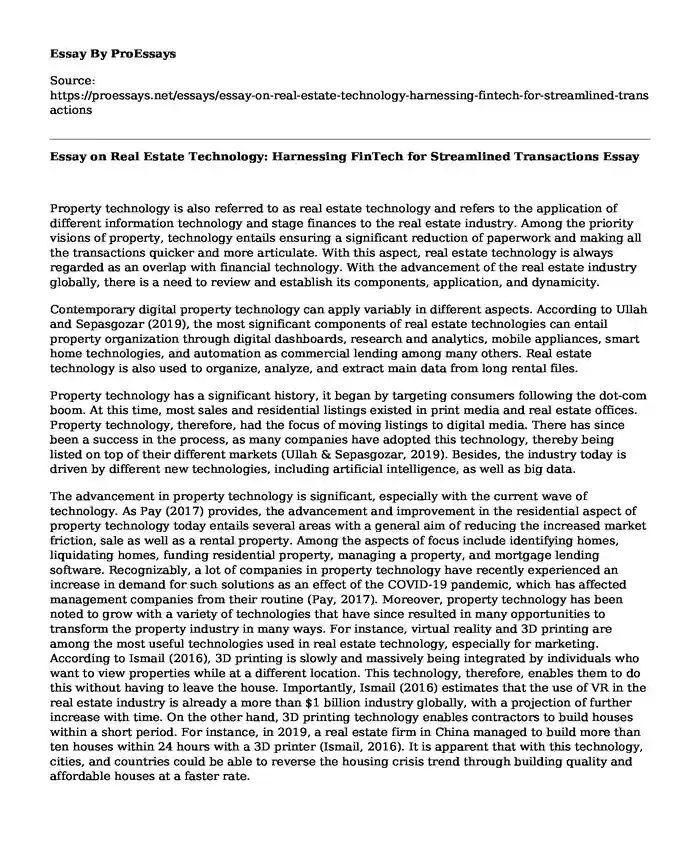Property technology is also referred to as real estate technology and refers to the application of different information technology and stage finances to the real estate industry. Among the priority visions of property, technology entails ensuring a significant reduction of paperwork and making all the transactions quicker and more articulate. With this aspect, real estate technology is always regarded as an overlap with financial technology. With the advancement of the real estate industry globally, there is a need to review and establish its components, application, and dynamicity.
Contemporary digital property technology can apply variably in different aspects. According to Ullah and Sepasgozar (2019), the most significant components of real estate technologies can entail property organization through digital dashboards, research and analytics, mobile appliances, smart home technologies, and automation as commercial lending among many others. Real estate technology is also used to organize, analyze, and extract main data from long rental files.
Property technology has a significant history, it began by targeting consumers following the dot-com boom. At this time, most sales and residential listings existed in print media and real estate offices. Property technology, therefore, had the focus of moving listings to digital media. There has since been a success in the process, as many companies have adopted this technology, thereby being listed on top of their different markets (Ullah & Sepasgozar, 2019). Besides, the industry today is driven by different new technologies, including artificial intelligence, as well as big data.
The advancement in property technology is significant, especially with the current wave of technology. As Pay (2017) provides, the advancement and improvement in the residential aspect of property technology today entails several areas with a general aim of reducing the increased market friction, sale as well as a rental property. Among the aspects of focus include identifying homes, liquidating homes, funding residential property, managing a property, and mortgage lending software. Recognizably, a lot of companies in property technology have recently experienced an increase in demand for such solutions as an effect of the COVID-19 pandemic, which has affected management companies from their routine (Pay, 2017). Moreover, property technology has been noted to grow with a variety of technologies that have since resulted in many opportunities to transform the property industry in many ways. For instance, virtual reality and 3D printing are among the most useful technologies used in real estate technology, especially for marketing. According to Ismail (2016), 3D printing is slowly and massively being integrated by individuals who want to view properties while at a different location. This technology, therefore, enables them to do this without having to leave the house. Importantly, Ismail (2016) estimates that the use of VR in the real estate industry is already a more than $1 billion industry globally, with a projection of further increase with time. On the other hand, 3D printing technology enables contractors to build houses within a short period. For instance, in 2019, a real estate firm in China managed to build more than ten houses within 24 hours with a 3D printer (Ismail, 2016). It is apparent that with this technology, cities, and countries could be able to reverse the housing crisis trend through building quality and affordable houses at a faster rate.
References
Pay, A. (2017). How the property sector is using technology to innovate. The Telegraph. Retrieved 11 August 2020, https://www.telegraph.co.uk/connect/better-business/innovation/how-property-sector-is-using-tech-to-innovate/.
Ismail, N. (2016). Technology is revolutionising the property industry - Information Age. Information Age. Retrieved 11 August 2020, https://www.information-age.com/technology-revolutionising-property-industry-123462947/.
Ullah, F., & Sepasgozar, S. M. (2019). A study of Information Technology Aadoption for Rreal-Eestate management: A Dynamic System Model. 469-484. https://www.researchgate.net/publication/333051850_A_Study_of_Information_Technology_Adoption_for_Real-Estate_Management_A_System_Dynamic_Model
Cite this page
Essay on Real Estate Technology: Harnessing FinTech for Streamlined Transactions. (2023, Nov 03). Retrieved from https://proessays.net/essays/essay-on-real-estate-technology-harnessing-fintech-for-streamlined-transactions
If you are the original author of this essay and no longer wish to have it published on the ProEssays website, please click below to request its removal:
- Essay Sample on Probationary Firefighter
- Essay Example on Police Nab Suspect in Overnight Taco Bell Break-In
- Essay Sample on Hot in Real Estate: Energy Upgrade California Program
- Photoshop Media Innovation Essay
- Uber's Rise to World Domination: Issues and Challenges Ahead - Essay Sample
- Research Paper on Real Estate: Luxury & High-Income Generating Industry
- Research Paper Example on Innovate & Entrepreneur: The Keys To Success In A Competitive Market







